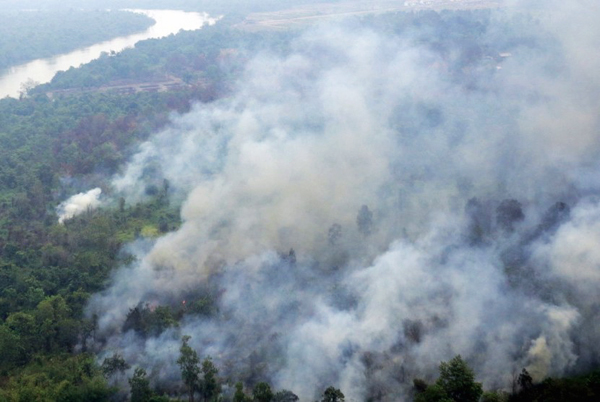APP-Sinar Mas Forestry Launches Situation Room
To strengthen its efforts in the prevention and mitigation of land and forest fires, Asia Pulp & Paper (APP)-Sinar Mas, Jakarta, Indonesia, this week activated the Situation Room at its head office in Jakarta. "With this Situation Room center, we can monitor hotspots around our suppliers’ concessions in real time," said Sujica Lusaka, GM, fire management at APP-Sinar Mas.
The Information Technology (IT) team at Sinar Mas Forestry has developed a new system that combines information from multiple sources to accurately map the emergence of hotspots in near real-time. "The system collects data from the Geospatial Information System (GIS) and overlays this with maps and geothermal imaging captured through our aircraft monitoring. The combination of this data is expected to improve both the accuracy and speed of fire detection," added Lusaka.
Initial information is captured via geothermal cameras onboard APP-Sinar Mas’s Cessna aircraft, which allows for the location of emerging hotspots to be communicated to the district within two minutes. The aircraft patrols APP suppliers’ concessions in Sumatra for six hours per day, scaling up or down based on the Fire Danger Rating System (FDRS).
Data for the FDRS in the Situation Room’s map is obtained from Indonesia’s national climate agency, the BMKG, and is merged with Automatic Weather System data (AWS), which includes current humidity, wind direction, temperature, and air pressure. This is available in all supplier districts, enabling real-time knowledge of current weather conditions – and how they impact the spread of fire – both inside and outside of the concession. This enables forestry teams to identify the areas of highest priority and act accordingly.
"The Situation Room is controlled by four operators and one supervisor," said Lusaka. "When the FDRS shows a yellow rating in terms of the land being fire-prone, the Situation Room kicks into 24/7 operation. The technology that we have developed monitors actual fires, whereas previous technologies have only been able to detect hotspots. What is important to establish is that hotspots are different from fire spots, and that hotspots do not always become actual fires. In addition, satellites that monitor hotspots can take between six and twelve hours. Our new technology monitors real fire in real time, taking less than two minutes to process and distribute data into an intranet portal that can be accessed by entire districts of our suppliers."

Director of Sinar Mas Forestry Elim Sritaba confirms a more proactive approach, whereby firefighting in any region that lasts more than one day will be re-evaluated. "We will coordinate with other districts to take greater measures, mobilizing brigades and equipment from different regions. The key to successfully fighting fire is speed, which the new system is built around," she added.
Sritaba also revealed that out of the total $20 million investment by APP-Sinar Mas in 2016 for fire prevention and suppression, $5 million was invested in developing the new system, including the geothermal imaging. APP-Sinar Mas will act decisively against APP suppliers that do not comply with the procedures prescribed under the new system. "Maintaining and preventing the emergence of fire spots requires the cooperation of many stakeholders, including the suppliers and contractors that are located within our concessions," she explained.
Currently, APP-Sinar Mas is deploying firefighting squads on the ground, known as Regu Pemadam Kebakaran (RPK), to optimize forest fire prevention efforts both within APP and its suppliers’ concessions, as well as outside of concession perimeters (to a maximum radius of 5 km). In addition, four helicopters and significant heavy equipment including pumps, hoses, and nozzles are on standby. Lastly, APP-Sinar Mas has built more than 400 posts and 80 fire-monitoring towers.
"Currently, we also have 1,600 RPK firefighters certified by Manggala Agni, whose duties are to monitor and extinguish fires. During the wet season, the troops continue to undergo training and skills development," concluded Lusaska.
TAPPI
http://www.tappi.org/

